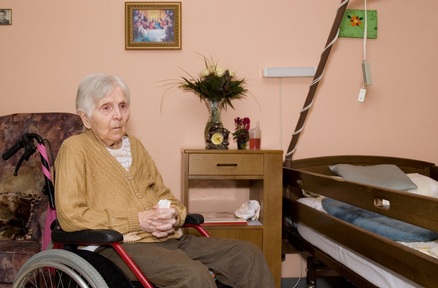Home care workers take on role of nurses as more people live longer with complex health needs
Homecare workers are increasingly being expected to take on work that would have been done by district nurses, as the number of people living longer with complex health conditions grows.

The Global Burden of Disease study reveals that in the last 20 years, dementia has risen from being the 24th leading cause of death in the UK to the 10th.
“Dementia is now one of the top ten, and fastest rising causes of death. As well as the untold human cost, dementia costs the economy £23bn a year,” says Andrew Chidgey, director of external affairs from the Alzheimer’s Society.
The study also found the UK’s life expectancy has risen in 2012 compared to the 1990 study by 4.2 years to 79.9 years, so has the average for other similar European countries.
This will undoubtedly impact on the home care sector as an ageing population will need more care to support them through prolonged disability in the later years of their lives.

Colin Angel, policy and campaigns director for United Kingdom Homecare Association Ltd said: “Over recent years, the homecare sector has seen a dramatic increase in the range of people who are supported at home with complex health needs and we know that this trend will continue. Today’s homecare workers are increasingly expected to undertake roles that would have been reserved to district nurses just a few years ago.
“Providers must reassure themselves that their workers are suitably trained and experienced for the work expected of them, but it is vital that NHS and local authorities recognise the urgency of resourcing adequate training for the workforce when they commission services that support users with complex healthcare needs.”
The Alzheimer’s Society has predicted that in less than ten years one million people will be living with dementia. Mr Chidgey, said: “Despite these statistics and the fact one in three people over the age of 65 will develop it, funding for dementia research lags far behind other conditions like cancer. With numbers soaring and costs trebling we need urgent action to find more effective treatments and ultimately defeat dementia.”
Simon Chapman, director of policy and parliamentary affairs at the National Council for Pal-liative Care would like to see people receiving better end of life care. He observed: "With growing numbers of people living longer with complex health and care needs we must priori-tise innovative and creative ways to ensure they receive excellent end of life care in the place they want to be, which for many people is in their own home.
“End of life is a stage of life, not a condition, and ensuring all staff are trained in communica-tion skills as well as symptom control will have knock on benefits across all services."
Leading experts and policy makers carried out the Global Burden of Disease study collecting information from the UK and 18 other countries including the original 15 members of the European Union, Australia, Canada, Norway and the USA. It compared the results of the GBD 1990 to the GBD 2010 to analyse trends and relative performance in areas such as mortality, years people will live with disability and years of life lost through illness and disease.

These countries were chosen because they have a similar expenditure on health care and the results presented were for 259 diseases and injuries, and 67 risk factors, as well as comparing data for disability adjusted life years between 1990 and 2010.
Professor Kevin Fenton, director of health and wellbeing at Public Health England, said: “This report is both a wake-up call and an opportunity for the UK. While it’s encouraging that overall the health of the UK has improved substantially since the last report, the pace of improvement is not enough.
In several areas such as the UK’s severe tobacco epidemic, breast cancer, heart disease and respiratory infections, the UK seems to be achieving poorly compared to its European neighbours.
Professor John Newton, chief knowledge officer at Public Health England, said: “These relatively poor results for mortality and disability in the UK require a response at every level and from all responsible authorities. For example, the data on contribution of different risk factors clearly show the need to redouble our efforts on smoking, high blood pressure and obesity.
Another concern raised by the study is that the levels of disability at specific ages did not improve. Most other countries share this problem to a lesser or greater degree, which means that although people are living longer, they can expect to have longer periods of disability during this time.
The major causes of disability differ by age, and include mental behavioural disorders such as depression, anxiety and schizophrenia, and musculoskeletal disorders like lower back pain and osteoarthritis.
Mr Newton of Public Health England continued: “We should be proud that life expectancy in the UK has increased as much as it has since 1990, but we need to make sure that these extra years are healthy ones. As a society we must look after our vulnerable people better. Poor mental health causes an enormous and increasing burden of disability as does the pain and disability of arthritis, and loss of independence due to poor sight, hearing and incontinence.

“The GBD study only looked at figures for the whole country but within the UK we know we have areas such as the South East and South West that achieve results as good as any of these countries. But there are also areas such as the North West which do as badly as the worst and this is completely unacceptable.”
The authors of the report, leading experts and policy makers have recommended several specific initiatives to address these deficiencies.
Reflecting on the results of the analysis of the Global Burden of Disease Study, Health Secretary Jeremy Hunt said: “Despite real progress in cutting deaths we remain a poor relative to our global cousins on many measures of health, something I want to change.
Mr Hunt continued: “For too long we have been lagging behind and I want the reformed health system to take up this challenge and turn this shocking underperformance around.”
Latest News Analysis
 04-Sep-19
Extra £1.5 billion announced for social care in Chancellor's Spending Review
04-Sep-19
Extra £1.5 billion announced for social care in Chancellor's Spending Review
 17-Jul-19
Flexible Working Bill for all jobs gets MPs approval - delighting parents, disabled and carers
17-Jul-19
Flexible Working Bill for all jobs gets MPs approval - delighting parents, disabled and carers
 18-Jun-19
Overnight care workers forced to sleep in offices and told 'bring your own bedding'
18-Jun-19
Overnight care workers forced to sleep in offices and told 'bring your own bedding'
 11-Jun-19
PM candidates on social care: Rory Stewart calls fixing care an 'unfinished revolution'
11-Jun-19
PM candidates on social care: Rory Stewart calls fixing care an 'unfinished revolution'
 05-Mar-19
Amber Rudd announces scrapping of controversial PIP payment review for pensioners
05-Mar-19
Amber Rudd announces scrapping of controversial PIP payment review for pensioners